spring boot 尚桂谷学习笔记04 ---Web开始
Posted lixuchun
tags:
篇首语:本文由小常识网(cha138.com)小编为大家整理,主要介绍了spring boot 尚桂谷学习笔记04 ---Web开始相关的知识,希望对你有一定的参考价值。
------web开发------
1.创建spring boot 应用 选中我们需要的模块
2.spring boot 已经默认将这些场景配置好了 @EnableAutoConfiguration 注解配置
只需要在配置文件中指定少量配置 就可以运行起来
3.自己编写自己的逻辑代码
自动配置原理
这个springboot帮助我们配置了什么 是否可以修改 如何修改 能不能扩展。。。。。。
xxxAutoConfiguration :帮助我们自动配置容器组件 底层调用@EnableConfigurationProperties
@EnableConfigurationProperties(xxxPropeties.class) 底层调用 @ConfigurationProperties
xxxConfigurationProperties:配置类来封装配置文件内容
spring boot 对静态资源的映射规则:
spring 配置文件 :spring-boot-autoconfigure-2.0.1.RELEASE.jar!\\org\\springframework\\boot\\
autoconfigure\\web\\servlet\\WebMvcAutoConfiguration.class
@ConfigurationProperties( prefix = "spring.resources", ignoreUnknownFields = false ) public class ResourceProperties { private static final String[] CLASSPATH_RESOURCE_LOCATIONS = new String[]
{"classpath:/META-INF/resources/", "classpath:/resources/", "classpath:/static/", "classpath:/public/"};
可以设置和静态资源有关的参数 缓存时间等
public void addResourceHandlers(ResourceHandlerRegistry registry) { if (!this.resourceProperties.isAddMappings()) { logger.debug("Default resource handling disabled"); } else { Duration cachePeriod = this.resourceProperties.getCache().getPeriod(); CacheControl cacheControl = this.resourceProperties.getCache().getCachecontrol().toHttpCacheControl(); if (!registry.hasMappingForPattern("/webjars/**")) { this.customizeResourceHandlerRegistration(registry.addResourceHandler(new String[]{"/webjars/**"})
.addResourceLocations(new String[]
{"classpath:/META-INF/resources/webjars/"})
.setCachePeriod(this.getSeconds(cachePeriod)).setCacheControl(cacheControl)); } String staticPathPattern = this.mvcProperties.getStaticPathPattern(); if (!registry.hasMappingForPattern(staticPathPattern)) { this.customizeResourceHandlerRegistration(
registry.addResourceHandler(new String[]{staticPathPattern})
.addResourceLocations(getResourceLocations(this.resourceProperties.getStaticLocations()))
.setCachePeriod(this.getSeconds(cachePeriod)).setCacheControl(cacheControl)); } } }
1). 所有的/webjars/** 都去classpath:/META-INFO/resources/webjars/ 下找资源
Webjar : 以jar包的方式引入静态资源 http://www.webjars.org/ 参考
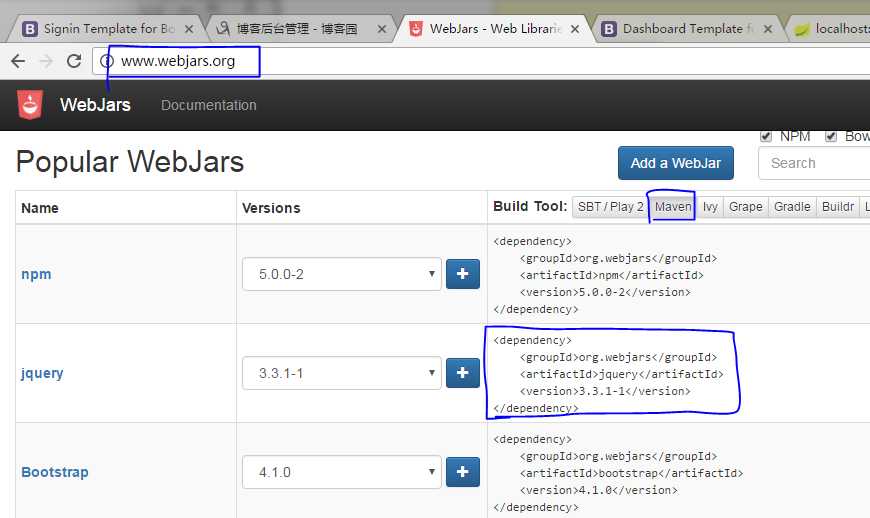
引入 jquery 331版本到pom文件中 就是引入jquery了

localhost:8080/webjars/abc -》 都去classpath:/META-INFO/resources/webjars/下寻找
eg: jquery实例引入 访问可以访问到 jquery.js 文件
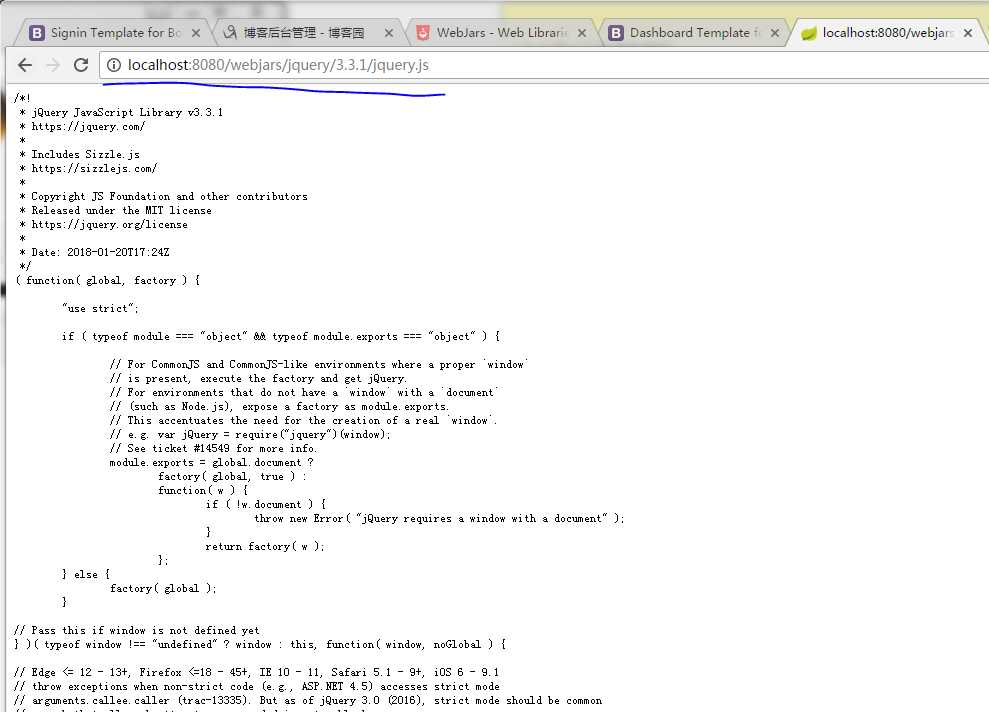
2). /** 访问当前项目任何资源(静态资源的文件夹 一共四个文件夹)

localhost:8080/abc =====》去静态资源中访问 abc
3).欢迎页 静态资源文件夹下的 index.html 页面 被 /** 映射
localhost:8080/ =====》 找index 页面

4).喜欢的额图标 /favicon.ico 都是在静态资源文件夹下寻找
5).自己定义静态资源文件夹后 之前的四个静态资源文件夹路径就不好用了

------引入thymeleaf------
springboot 嵌入式tomcat 不支持jsp 的,所以需要引用模板引擎
模板引擎:
jsp, Velocity, thymeleaf .....
模板引擎作用:将数据通过表达式引入到页面中做展示
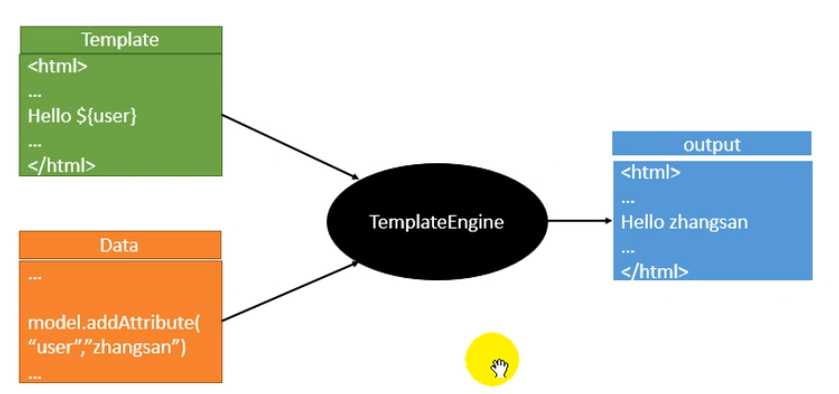
spring boot 推荐thymeleaf :
语法简单 功能强大
引入thymeleaf 框架 pom 文件 导入jar包
<dependency> <groupId>org.springframework.boot</groupId> <artifactId>spring-boot-starter-thymeleaf</artifactId> </dependency>
默认使用 thymeleaf 2.--- 版本过老 可以 手动改用 3.--版本
https://docs.spring.io/spring-boot/docs/1.5.13.BUILD-SNAPSHOT/reference/htmlsingle/
在pom 文件的 properties中加入如下:
<properties> <thymeleaf.version>3.0.2.RELEASE</thymeleaf.version> <thymeleaf-layout-dialect.version>2.1.1</thymeleaf-layout-dialect.version> </properties>
通过以下 方法修改spring boot 为我们自动配置的jar包版本依赖

Thymeleaf 使用语法:在autoconfiguration 包中找到 thymeleaf 配置文件进行配置

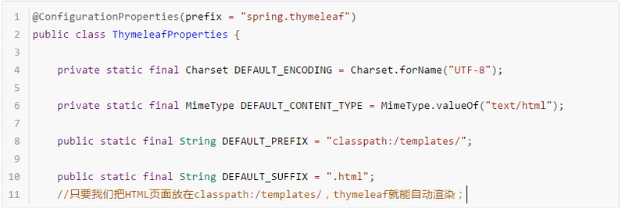
thymeleaf 语法:
使用:https://www.thymeleaf.org/doc/tutorials/3.0/usingthymeleaf.pdf
1 导入thymeleaf 的名称空间
<html lang="en" xmlns:th="http://www.thymeleaf.org">
2 使用thymeleaf 语法
<!DOCTYPE html> <html lang="en" xmlns:th="http://www.thymeleaf.org"> <head> <meta charset="UTF-8"> <title>Title</title> </head> <body> <h1>成功</h1> <!-- 将div的文本内容指定为指定的值 --> <div th:text="${hello}"> 这是现实的欢迎信息 </div> </body> </html>
3.语法规则:
1). th:text; 改变当前元素文本内容
th: 任意html 属性;用来替换原生属性的值
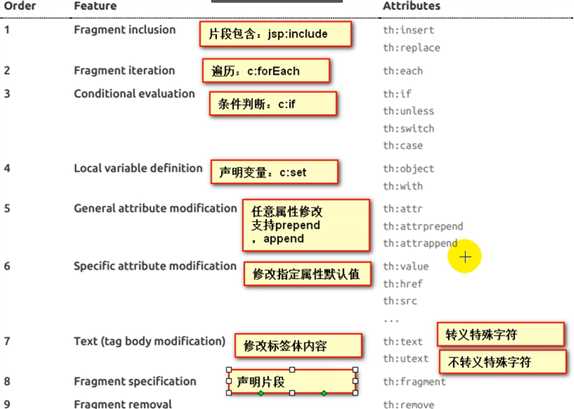
2.表达式写法
Simple expressions: (表达式语法) Variable Expressions: ${...}: 获取变量值;ognl表达式
1.获取对象属性,调用方法
2.使用内置的基本对象
#ctx : the context object.
#vars: the context variables.
#locale : the context locale.
#request : (only in Web Contexts) the HttpServletRequest object.
#response : (only in Web Contexts) the HttpServletResponse object.
#session : (only in Web Contexts) the HttpSession object.
#servletContext : (only in Web Contexts) the ServletContext object.
3.内置的一些工具对象
#execInfo : information about the template being processed.
#messages : methods for obtaining externalized messages inside variables expressions, in the same way as they
would be obtained using #{…} syntax.
#uris : methods for escaping parts of URLs/URIs
#conversions : methods for executing the configured conversion service (if any).
#dates : methods for java.util.Date objects: formatting, component extraction, etc.
#calendars : analogous to #dates , but for java.util.Calendar objects.
#numbers : methods for formatting numeric objects.
#strings : methods for String objects: contains, startsWith, prepending/appending, etc.
#objects : methods for objects in general.
#bools : methods for boolean evaluation.
#arrays : methods for arrays.
#lists : methods for lists.
#sets : methods for sets.
#maps : methods for maps.
#aggregates : methods for creating aggregates on arrays or collections.
#ids : methods for dealing with id attributes that might be repeated (for example, as a result of an iteration).
// 功能和 ${...}相似 Selection Variable Expressions: *{...}
补充 配合 th:objiect=${session.user} 使用 *{name} 代表 ${session.user.name}
<div th:object=${session.user}>
<p th:*{name}/>
</div>
Message Expressions: #{...}: // 获取国际化内容 Link URL Expressions: @{...} // 定义URL
@{/order/process(execId=${execId},execType=‘FAST’)} Fragment Expressions: ~{...} ; // 片段引用表达式
<div th:insert="~{common::main}">...</div> Literals(字面量) Text literals: ‘one text‘ , ‘Another one!‘ ,… Number literals: 0 , 34 , 3.0 , 12.3 ,… Boolean literals: true , false Null literal: null Literal tokens: one , sometext , main ,… Text operations: String concatenation: + Literal substitutions: |The name is ${name}| Arithmetic operations: // 数学运算 Binary operators: + , - , * , / , % Minus sign (unary operator): - Boolean operations: // 布尔运算 Binary operators: and , or Boolean negation (unary operator): ! , not Comparisons and equality: // 比较运算 Comparators: > , < , >= , <= ( gt , lt , ge , le ) Equality operators: == , != ( eq , ne ) Conditional operators: // 条件运算 If-then: (if) ? (then) If-then-else: (if) ? (then) : (else) Default: (value) ?: (defaultvalue) Special tokens: (特殊操作) No-Operation: _
eg : 实例
controller 代码
// 查出一些数据做展示 @RequestMapping("/success") public String success(Map<String, Object> map) { // classpath:/templates/ 跳转到此路径下的success.html 页面 map.put("hello", "<h1>你好</h1>"); map.put("users", Arrays.asList("张三", "李四", "王五")); return "success"; }
html 代码:其中 [[${user}]] 为不转义 [(${user})] 为转义user内容
<!DOCTYPE html> <html lang="en" xmlns:th="http://www.thymeleaf.org"> <head> <meta charset="UTF-8"> <title>Title</title> </head> <body> <h1>成功</h1> <!-- 将div的文本内容指定为指定的值 --> <div th:text="${hello}"> 这是现实的欢迎信息 </div> <div th:utext="${hello}"> </div> <!-- th:each 每次便利都会生成当前这个标签 3个 h4--> <h4 th:text="${user}" th:each="user:${users}"></h4> <h4> <span th:each="user:${users}">[[${user}]]</span> </h4> </body> </html>
4.springmvc 的自动配置
eg: WebMvcAutoConfiguration.class
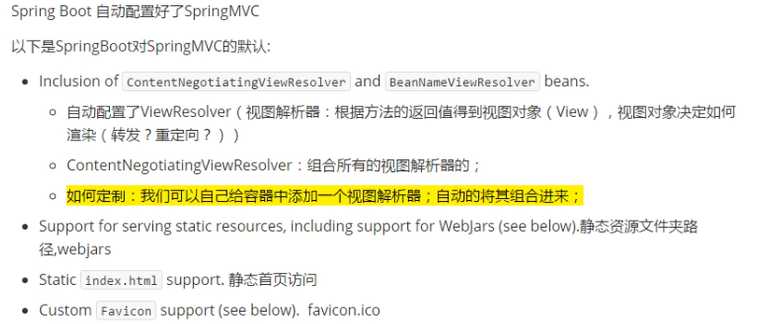

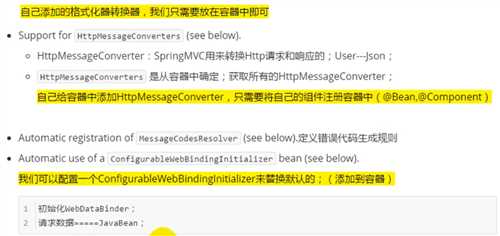
org.springframework.boot.autoconfigure.web: web 配置的所有自动场景
扩展 springmvc 比如增加 拦截器 路径响应等等

编写一个配置类完成上面代码功能 eg :
@Configuration 是 WebMvcConfigurerAdapter 类型,不能标注@EnableWebMvc注解
既保留了所有的自动配置 也可以用我们扩展的配置
package com.lixuchun.springboot.config; import org.springframework.context.annotation.Configuration; import org.springframework.web.servlet.config.annotation.ViewControllerRegistry; import org.springframework.web.servlet.config.annotation.WebMvcConfigurerAdapter; // 使用 WebMvcConfigurerAdapter 可以扩展springmvc 功能 @Configuration public class MyMvcConfig extends WebMvcConfigurerAdapter { @Override public void addViewControllers(ViewControllerRegistry registry) { // super.addViewControllers(registy) // 浏览器发送 /lixuchun 请求来到 success 页面 registry.addViewController("/lixuchun").setViewName("success"); } }
页面发送请求到 localhost:8080/lixuchun -》跳转到 success 页面
原理:
1).WebMvcAutoConfiguretion 是 springmvc 的自动配置类
2).在做其他配置时候 会导入;@import(EnableWebMvcConfiguration.class)
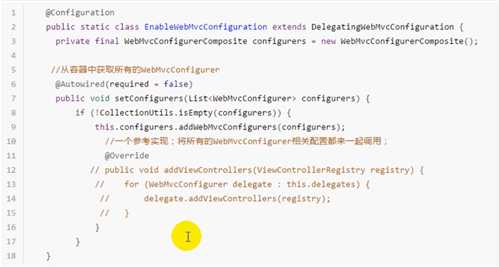
3).容器中所有的WebMvcConfigure都会一起起作用
4). 我们的配置类也会起作用
效果:springMvc的自动配置和我们的扩展配置都会起作用
全面接管 springmvc
springboot 对springmvc所有的自动配置都不用了 所有的配置都自己进行配置;
我们需要对自己的mvc配置文件添加 @EnableWebMvc 就可以了
--------不推荐全面接管--------
为什么 加上@EnableWebMvc 就全面接管了
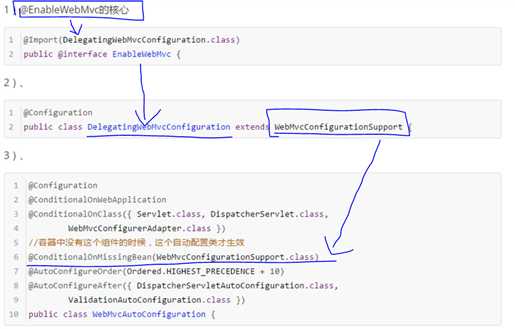

5. 如何修改spring boot 的默认配置:
有统一的模式:
1). spring boot 在自动配置组件时候 先看容器中有没有用户自己配置的(@Bean @Component )
如果有则用用户自定义的组件 在没有的情况下才使用系统默认注入的组件,有很多组件可以有多个
比如 (ViewResoler) 将用户的注解配置和默认的自动装配的配置进行结合
2). 在springboot 中 会有很多的 xxxConfigure 帮助我们进行扩展配置
6.RestfulCRUD 访问
在 template 以及 static文件夹下加入页面以及css js img图片
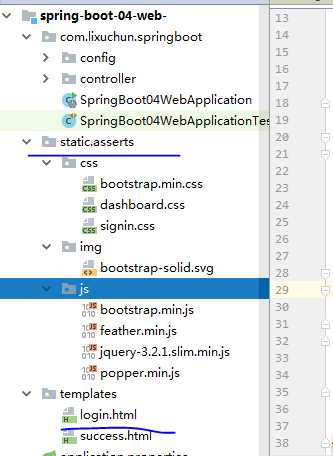
修改 之前的 mvc 配置文件:webMvcConfigurerAdapter 访问 / 和 /login.html 都跳转到 login 页面 (templates下)
package com.lixuchun.springboot.config; import org.springframework.context.annotation.Bean; import org.springframework.context.annotation.Configuration; import org.springframework.web.servlet.config.annotation.ViewControllerRegistry; import org.springframework.web.servlet.config.annotation.WebMvcConfigurerAdapter; // 使用 WebMvcConfigurerAdapter 可以扩展springmvc 功能 @Configuration public class MyMvcConfig extends WebMvcConfigurerAdapter { @Override public void addViewControllers(ViewControllerRegistry registry) { // super.addViewControllers(registy) // 浏览器发送 /lixuchun 请求来到 success 页面 registry.addViewController("/lixuchun").setViewName("success"); } @Bean public WebMvcConfigurerAdapter webMvcConfigurerAdapter() { WebMvcConfigurerAdapter adapter = new WebMvcConfigurerAdapter() { @Override public void addViewControllers(ViewControllerRegistry registry) { registry.addViewController("/").setViewName("login"); registry.addViewController("/login.html").setViewName("login"); } }; return adapter; } }
login 页面 :引入 thymeleaf 模板,导入webjars 包下的js 以及 css文件
<!DOCTYPE html> <!-- saved from url=(0050)http://getbootstrap.com/docs/4.0/examples/sign-in/ --> <html lang="en" xmlns:th="http://www.thymeleaf.org"> <head><meta http-equiv="Content-Type" content="text/html; charset=UTF-8"> <meta name="viewport" content="width=device-width, initial-scale=1, shrink-to-fit=no"> <meta name="description" content=""> <meta name="author" content=""> <link rel="icon" href="http://getbootstrap.com/favicon.ico"> <title>Signin Template for Bootstrap</title> <!-- Bootstrap core CSS --> <link href="asserts/css/bootstrap.min.css" th:href="@{/webjars/bootstrap/4.0.0/css/bootstrap.css}" rel="stylesheet"> <!-- Custom styles for this template --> <link href="asserts/css/signin.css" th:href="@{asserts/css/signin.css}" rel="stylesheet"> </head> <body class="text-center"> <form class="form-signin"> <img class="mb-4" src="asserts/img/bootstrap-solid.svg" th:src="@{asserts/img/bootstrap-solid.svg}" alt="" width="72" height="72"> <h1 class="h3 mb-3 font-weight-normal">Please sign in</h1> <label for="inputEmail" class="sr-only">Email address</label> <input type="email" id="inputEmail" class="form-control" placeholder="Email address" required="" autofocus=""> <label for="inputPassword" class="sr-only">Password</label> <input type="password" id="inputPassword" class="form-control" placeholder="Password" required=""> <div class="checkbox mb-3"> <label> <input type="checkbox" value="remember-me"> Remember me </label> </div> <button class="btn btn-lg btn-primary btn-block" type="submit">Sign in</button> <p class="mt-5 mb-3 text-muted">? 2017-2018</p> </form> </body></html>
最后访问:
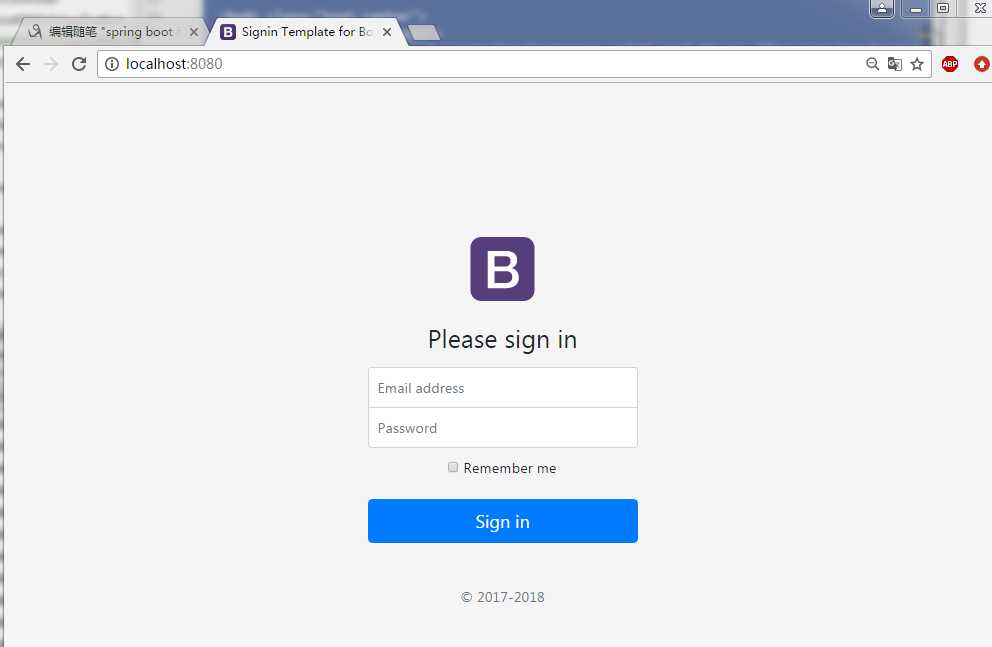
国际化:
springmvc实现:
编写国际化配置文件
使用ResourceBundleMessageSource 管理国际化资源文件
在页面使用fmt:message 去除国际化内容
spring boot 实现
编写国际化配置文件 抽取页面需要的信息:

spring boot 已经自动 配置好了 管理国际化的资源文件的组件的组件
@EnableConfigurationProperties public class MessageSourceAutoConfiguration { @Bean @ConfigurationProperties( prefix = "spring.messages" ) @Bean public MessageSource messageSource() { MessageSourceProperties properties = this.messageSourceProperties(); ResourceBundleMessageSource messageSource = new ResourceBundleMessageSource(); if (StringUtils.hasText(properties.getBasename())) {
// 设置国际化的资源文件的基础名称(login.properties) 去掉语言的国家的代码 messageSource.setBasenames(StringUtils.commaDelimitedListToStringArray(StringUtils.trimAllWhitespace(properties.getBasename()))); } if (properties.getEncoding() != null) { messageSource.setDefaultEncoding(properties.getEncoding().name()); } messageSource.setFallbackToSystemLocale(properties.isFallbackToSystemLocale()); Duration cacheDuration = properties.getCacheDuration(); if (cacheDuration != null) { messageSource.setCacheMillis(cacheDuration.toMillis()); } messageSource.setAlwaysUseMessageFormat(properties.isAlwaysUseMessageFormat()); messageSource.setUseCodeAsDefaultMessage(properties.isUseCodeAsDefaultMessage()); return messageSource; }
application.properties 配置基础名称值
spring.messages.basename=i18n.login
页面进行取值:#{...}就可以取得properties值

修改login.html文件进行国际化取值:#{...}进行取值
[[#{login.remember}]] checkbox 是 input 标签 不是标准<></>结构 需要特殊取值
<!DOCTYPE html> <!-- saved from url=(0050)http://getbootstrap.com/docs/4.0/examples/sign-in/ --> <html lang="en" xmlns:th="http://www.thymeleaf.org"> <head><meta http-equiv="Content-Type" content="text/html; charset=UTF-8"> <meta name="viewport" content="width=device-width, initial-scale=1, shrink-to-fit=no"> <meta name="description" content=""> <meta name="author" content=""> <link rel="icon" href="http://getbootstrap.com/favicon.ico"> <title>Signin Template for Bootstrap</title> <!-- Bootstrap core CSS --> <link href="asserts/css/bootstrap.min.css" th:href="@{/webjars/bootstrap/4.0.0/css/bootstrap.css}" rel="stylesheet"> <!-- Custom styles for this template --> <link href="asserts/css/signin.css" th:href="@{asserts/css/signin.css}" rel="stylesheet"> </head> <body class="text-center"> <form class="form-signin"> <img class="mb-4" src="asserts/img/bootstrap-solid.svg" th:src="@{asserts/img/bootstrap-solid.svg}" alt="" width="72" height="72"> <h1 class="h3 mb-3 font-weight-normal" th:text="#{login.tip}">Please sign in</h1> <label for="inputEmail" class="sr-only" th:text="#{login.username}">Email address</label> <input type="email" id="inputEmail" th:placeholder="#{login.username}" class="form-control" placeholder="Email address" required="" autofocus=""> <label for="inputPassword" th:text="#{login.password}" class="sr-only">Password</label> <input type="password" th:placeholder="#{login.password}" id="inputPassword" class="form-control" placeholder="Password" required=""> <div class="checkbox mb-3"> <label> <input type="checkbox" value="remember-me"/> [[#{login.remember}]] </label> </div> <button class="btn btn-lg btn-primary btn-block" type="submit" th:text="#{login.btn}">Sign in</button> <p class="mt-5 mb-3 text-muted">? 2017-2018</p>
<a class="btn btn-sm" th:href="@{/index.html(l=‘zh_CN‘)}">中文</a>
<a class="btn btn-sm" th:href="@{/index.html(l=‘en_US‘)}">English</a>
</form> </body></html>
之后访问可能出现乱码 到setting 设置 file encoding
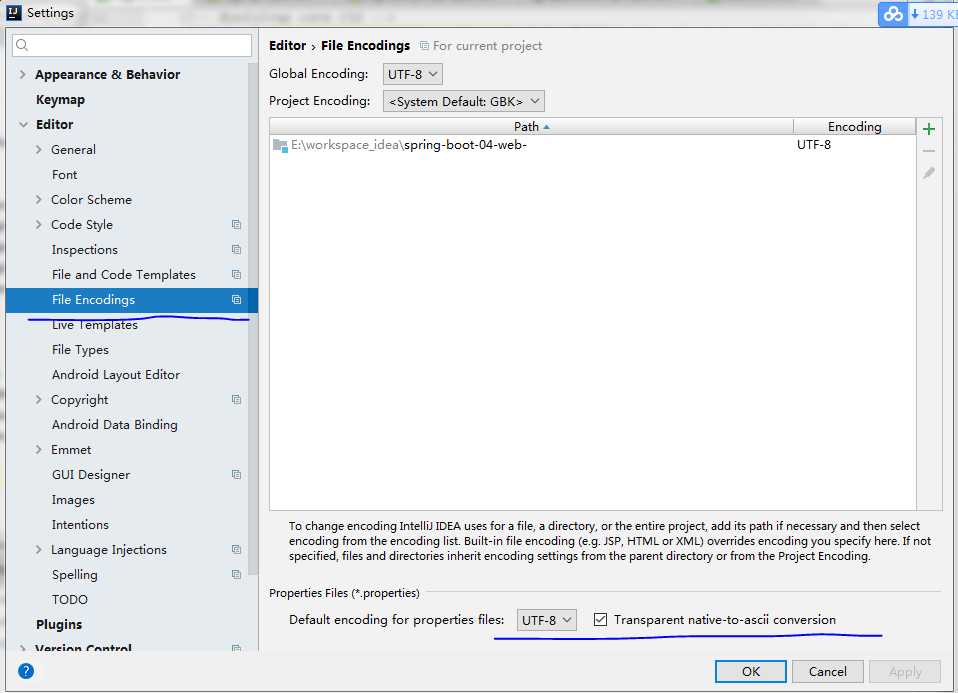
再次访问 通过改变浏览器语言改变页面的语言:
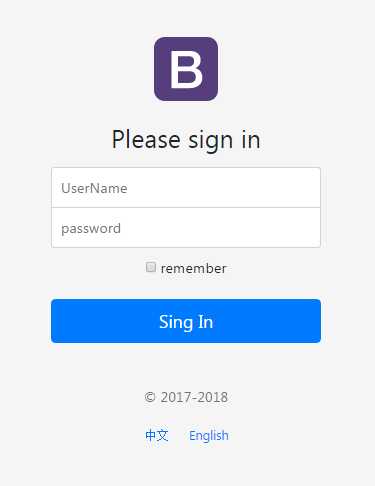
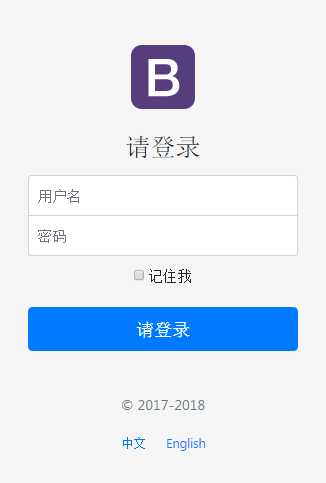
现在想实现点击页面 中文 : 英文进行国际化实现
原理 :国际化Locale(区域信息对象):localResolver 获取区域信息
默认的是根据请求头请求信息进行国际化设置
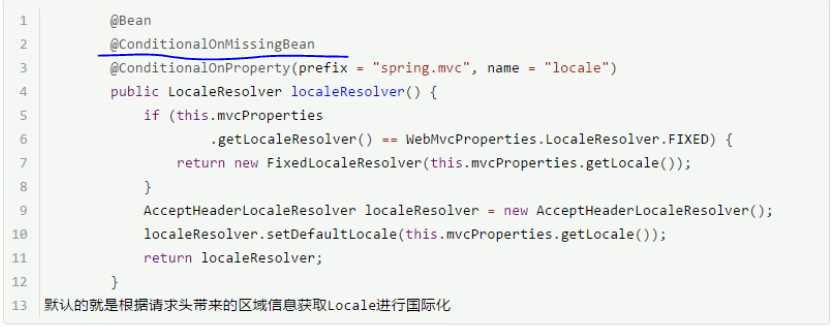
自己编写一个 LocalResolver 解析器 注入到容器中 使得系统默认的解析器失效 @ConditionalOnMissingBean
在方法上点击 Alt + Insert 可以添加实现接口的方法
package com.lixuchun.springboot.component; import org.springframework.lang.Nullable; import org.springframework.web.servlet.LocaleResolver; import org.thymeleaf.util.StringUtils; import javax.servlet.http.HttpServletRequest; import javax.servlet.http.HttpServletResponse; import java.util.Locale; /** * 可以在链接上携带区域信息 */ public class MyLocalResolver implements LocaleResolver{ @Override public Locale resolveLocale(HttpServletRequest request) { String l = request.getParameter("l"); Locale locale = Locale.getDefault(); if (!StringUtils.isEmpty(l)) { String[] split = l.split("_"); // 第一个语言代码 第二个国家代码 locale = new Locale(split[0], split[1]); } return locale; } @Override public void setLocale(HttpServletRequest httpServletRequest, @Nullable HttpServletResponse httpServletResponse, @Nullable Locale locale) { } }
注入到容器中:
package com.lixuchun.springboot.config; import com.lixuchun.springboot.component.MyLocalResolver; import org.springframework.context.annotation.Bean; import org.springframework.context.annotation.Configuration; import org.springframework.web.servlet.LocaleResolver; import org.springframework.web.servlet.config.annotation.ViewControllerRegistry; import org.springframework.web.servlet.config.annotation.WebMvcConfigurerAdapter; // 使用 WebMvcConfigurerAdapter 可以扩展springmvc 功能 @Configuration public class MyMvcConfig extends WebMvcConfigurerAdapter { @Override public void addViewControllers(ViewControllerRegistry registry) { // super.addViewControllers(registy) // 浏览器发送 /lixuchun 请求来到 success 页面 registry.addViewController("/lixuchun").setViewName("success"); } @Bean public WebMvcConfigurerAdapter webMvcConfigurerAdapter() { WebMvcConfigurerAdapter adapter = new WebMvcConfigurerAdapter() { @Override public void addViewControllers(ViewControllerRegistry registry) { registry.addViewController("/").setViewName("login"); registry.addViewController("/index.html").setViewName("login"); } }; return adapter; } @Bean public LocaleResolver localeResolver() { return new MyLocalResolver(); } }
上一篇:http://www.cnblogs.com/lixuchun/p/8969850.html
下一篇:todo
以上是关于spring boot 尚桂谷学习笔记04 ---Web开始的主要内容,如果未能解决你的问题,请参考以下文章